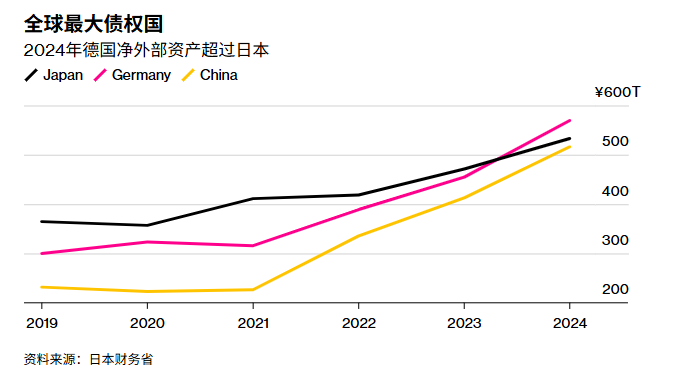Japan’s overseas assets have reached a record high, but it has lost its position as the world’s largest creditor nation for the first time in 34 years.
Data released by Japan’s Ministry of Finance on Tuesday showed that Japan’s net foreign assets reached 533.05 trillion yen (about 3.7 trillion US dollars) by the end of 2024, an increase of approximately 13% compared to the previous year. Despite this record high figure, Germany’s total net foreign assets have reached 569.7 trillion yen, surpassing Japan. China still ranks third with net assets of 516.3 trillion yen.
Germany’s rise is reflected in its huge current account surplus. In 2024, Germany’s current account surplus reached 248.7 billion euros, mainly due to its strong trade performance. Meanwhile, data from Japan’s Ministry of Finance shows that its current account surplus was 29.4 trillion yen, equivalent to approximately 180 billion euros. Last year, the euro appreciated by about 5% against the yen, which exaggerated the growth of German assets relative to Japanese assets (denominated in yen).

A country’s net foreign assets are the value of its overseas assets minus the value of domestic assets owned by foreigners, adjusted for changes in currency values. This figure is essentially reflected in the cumulative changes of the country’s current account.
Japanese Finance Minister Katsunobu Kato said on Tuesday that he was not disturbed by this development.
Kato told reporters, “Given that Japan’s net external assets are also steadily increasing, the ranking itself should not be regarded as a sign of a major change in Japan’s position.”
For Japan, the depreciation of the yen has led to an increase in both overseas assets and liabilities, but the growth rate of assets is faster, partly due to the expansion of overseas business investment.
The data released on Tuesday generally reflects the overall trend of foreign direct investment. According to the ministry, in 2024, Japanese companies maintained a strong interest in foreign direct investment, particularly in the United States and the United Kingdom. The ministry stated that industries such as finance, insurance, and retail attracted a significant amount of investment from Japanese investors.
Mizuho Bank’s chief market economist, Daisuke Toyoda, said that Japan is increasingly using its funds for direct investment rather than foreign securities, which means that it has become more difficult to repatriate funds quickly.
Karacamah said, “When risks arise, it’s easy to imagine domestic investors selling off foreign bonds and securities, but they won’t readily divest from overseas companies they have acquired.”
Looking ahead, the trend of outbound investment may hinge on whether Japanese companies continue to expand their overseas spending, particularly in the United States. With the implementation of President Donald Trump’s tariff policies, some companies may be incentivized to shift production or assets to the United States to mitigate trade-related risks.


